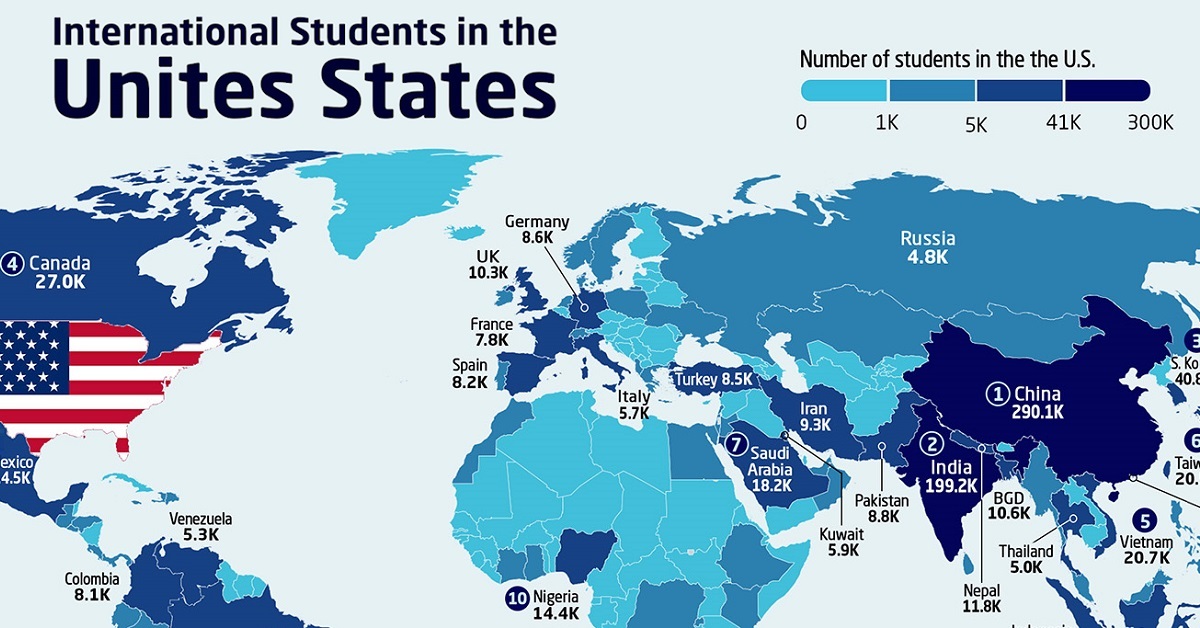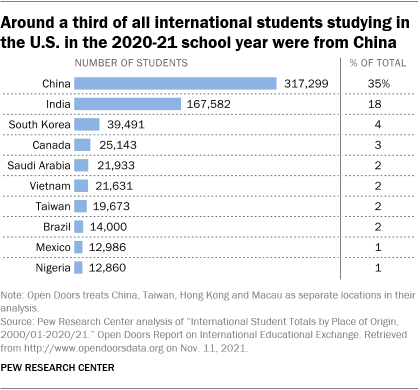International students in the USA face a unique set of challenges and opportunities. They contribute significantly to cultural diversity and economic vitality.
The United States remains a top destination for students from around the world seeking quality higher education. With renowned universities and a wide array of programs, international students can pursue their academic and professional goals in a dynamic and supportive environment.
Navigating visa requirements, cultural adjustments, and financial considerations are part of the experience. Resources and support services are often available at educational institutions to help international students acclimate and succeed. The presence of international students also enriches the educational experience for American students, fostering global awareness and cross-cultural communication on campus.
Introduction To International Students In The Usa
The United States stands as a beacon for higher education, attracting students from around the globe. These students embark on a journey not just for academic enrichment but also for the invaluable international exposure the U.S. offers. Universities across the nation pride themselves on welcoming diverse student bodies, with international scholars playing a pivotal role in this multicultural mosaic.
Growing Numbers Each Year
Year after year, the number of international students choosing the U.S. for their studies continues to rise. This consistent growth reflects the enduring appeal of American educational institutions. Let’s look at the data in a clear, easy-to-understand format:
Additional rows can be added to reflect more years
| Year | Number of International Students |
|---|---|
| 2018 | 1,094,792 |
| 2019 | 1,095,299 |
| 2020 | 1,075,496 |
The table above showcases the steady influx of learners, which is testament to the quality education and global recognition of U.S. degrees.
Diverse Origins And Backgrounds
International students in the USA come from a tapestry of cultures, each bringing unique perspectives to campus life. From Asia to Europe, Africa to South America, the variety of their origins enriches the educational experience for all. Below is a snapshot of the diversity:
-
- China – Largest contingent of international students
- India – Known for technical expertise and business acumen
- South Korea – High achievers in a variety of disciplines
- Saudi Arabia – Significant growth in recent years
Additional countries can be listed to highlight diversity
This diversity not only fosters a global perspective within the student community but also prepares graduates for the increasingly interconnected world.

Credit: poetsandquants.com
Reasons Behind Choosing The Usa
Many students from around the globe set their sights on the USA for higher education. The reasons are clear and compelling. This section explores the top factors that make the United States a premier destination for international students.
Reputation Of Educational Institutions
The United States boasts some of the world’s most prestigious universities. Institutions like Harvard, MIT, and Stanford are household names with stellar reputations. They offer high-quality education and cutting-edge research opportunities.
- Diverse study programs across all disciplines
- Faculties who are leaders in their fields
- State-of-the-art facilities that enhance learning experiences
These factors contribute to the high regard for U.S. educational institutions.
Career Opportunities Post-graduation
Graduates from U.S. universities have a competitive edge in the global job market. The USA is home to numerous multinational corporations and startups.
| Career Aspect | Benefit |
|---|---|
| Networking Opportunities | Connections with professionals and alumni |
| Job Market | Access to a diverse range of industries |
| Work Experience | Internships and practical training during studies |
Such benefits position graduates for successful careers post-graduation.
Initial Challenges Faced
Embarking on a journey as an international student in the USA opens doors to a world of new experiences. Yet, the transition comes with its own set of hurdles.
The initial phase is often the toughest, with adjustment challenges looming large. Let’s dive into the common obstacles that international students might face.
Cultural Shock And Adaptation
Arriving in the US, students encounter a new cultural landscape. This can be overwhelming. Let’s break down the adaptation process:
- Understanding Etiquette: Social norms in the US may differ vastly from those back home.
- Navigating Diversity: The US is a melting pot of cultures, which can be both exciting and challenging.
- Finding Community: Connecting with fellow students and local groups helps in easing the transition.
Language Barriers And Communication
For many, English is not the first language. This can lead to communication difficulties. Here are ways to overcome language barriers:
- Language Courses: Enroll in courses designed to improve English proficiency.
- Practice Regularly: Engage in conversations with native speakers for better fluency.
- Use Technology: Leverage language learning apps and tools to aid understanding.
Educational System Differences
International students in the USA face a unique set of challenges. One of the biggest is adapting to the educational system differences. Understanding these differences is crucial for success. Let’s explore the classroom culture and assessment methods in the US.
Classroom Culture And Expectations
The classroom environment in the US may differ greatly from what international students are used to. Participation is often a key component and students are encouraged to engage in discussions. This active involvement is sometimes part of the grade.
- Instructors expect questions – they see them as a sign of engagement.
- Group work is common, fostering teamwork skills.
- Respect for diverse opinions is a must in the classroom.
Assessment Methods
Assessment in the US educational system isn’t just about exams. It includes a variety of methods to evaluate student performance.
| Type of Assessment | Description | Percentage of Grade |
|---|---|---|
| Participation | Active involvement in class | 10%-20% |
| Homework | Assignments completed outside of class | 10%-30% |
| Projects | Long-term assignments with a specific goal | 15%-25% |
| Exams | Tests covering course material | 40%-60% |
These methods aim to assess knowledge application and critical thinking, not just memorization.
Support Systems For Integration
International students often face challenges when they arrive in the USA. These challenges can include language barriers, cultural differences, and homesickness. To help students overcome these challenges, many support systems are in place. These systems help students integrate into their new environment. They make the transition smoother and the experience enriching.
University Resources And Programs
Universities in the USA offer a wealth of resources for international students. These resources aim to support their academic and social integration. Orientation programs introduce students to campus life. Mentorship schemes pair new students with seniors. This helps them navigate university systems with ease.
- Academic support services like writing centers and language tutoring.
- Career centers offer guidance on internships and job opportunities.
- Counseling services provide emotional support and stress management.
These programs ensure students have the tools they need to succeed. They can focus on their studies while also enjoying their time in the USA.
Community Groups And Social Circles
Outside the university, community groups play a key role in helping students integrate. International student associations create a sense of belonging. They do this by organizing cultural events and social gatherings. Local community centers often host language exchange meetups. This is where students can practice English and make new friends.
| Community Group | Activities | Benefits |
|---|---|---|
| Language Exchange Clubs | Conversational practice | Language skills improvement |
| Cultural Associations | Cultural festivals, food fairs | Cultural exchange, networking |
| Sport Teams | Team sports, tournaments | Fitness, teamwork, fun |
By joining these groups, students can immerse themselves in the local culture. They can form lasting social connections. These experiences enrich their time abroad and help them build a global network.

Credit: www.visualcapitalist.com
Social Life And Extracurricular Engagement
Work Opportunities And Internships
Finding work and internships is vital for international students in the USA. These opportunities help students gain essential skills and earn some income while studying. Let’s explore the options available for international students regarding on-campus jobs and internships.
On-campus Employment
International students often start with on-campus jobs. These positions are convenient and comply with visa regulations. Students can work up to 20 hours per week during school terms. They can work full-time during breaks. Popular on-campus jobs include:
- Library assistant
- IT support
- Teaching assistant
These jobs do not require travel and fit well with academic schedules.
Internships Relevant To Their Field
Internships provide practical experience in a student’s field of study. They are crucial for building a professional network and enhancing a resume. To participate, students may need approval from their academic advisor and the international office. Types of internships include:
| Type | Description | Duration |
|---|---|---|
| Summer Internships | Work full-time in summer | 2-3 months |
| Co-op Internships | Alternate terms between work and study | 4-12 months |
Securing an internship in a relevant field can significantly enhance career prospects post-graduation.

Credit: www.pewresearch.org
Long-term Impact On Career And Personal Growth
The journey of international students in the USA often transforms their futures. This experience boosts career prospects and personal growth. Let’s dive into how this journey impacts their lives long-term.
Professional Network Expansion
Studying in the USA opens doors to global connections. Students meet peers, professors, and professionals from various sectors. Here’s how a larger network can help:
- Job opportunities: Connections often lead to job offers.
- Mentorship: Guidance from experienced professionals accelerates growth.
- Collaborations: Working with diverse individuals enhances skills and knowledge.
These relationships can last a lifetime, providing support and opportunities across the globe.
Personal Development Stories
Personal growth is a huge part of studying abroad. Hear from those who’ve lived this journey:
| Name | Country | Impact |
|---|---|---|
| Ana | Brazil | Learned new languages and cultures. |
| John | Canada | Became more independent and confident. |
| Ling | China | Improved leadership skills in diverse teams. |
These stories show the powerful impact of adapting to new environments and challenges.
Conclusion: Thriving And Adapting
The journey of international students in the USA paints a story of ambition and adaptability. These students have not just crossed borders but also cultural and academic hurdles to thrive in a diverse educational landscape. This conclusive section celebrates their resilience and looks at the essence of their experiences.
Summary Of Key Points
- Varied academic opportunities that attract students globally.
- Cultural diversity enriches both campus life and personal growth.
- Challenges like homesickness and language barriers are common yet surmountable.
- Support systems from universities aid in smoother transitions.
- Professional prospects post-graduation often drive student ambitions.
Final Thoughts On The Resilience Of International Students
International students showcase remarkable resilience. They turn challenges into stepping stones for success. Their stories inspire and remind us of the unstoppable human spirit. They adapt, they overcome, and most importantly, they succeed.
Frequently Asked Questions
How Many International Students Are In The Usa?
As of the 2021-2022 academic year, the United States hosts over 948,000 international students.
What Is Required To International Student In Usa?
International students in the USA need a valid passport, a student visa (F-1 or J-1), proof of financial support, academic records, and health insurance. They must also maintain full-time enrollment and report changes to their SEVP portal.
Where Do Most International Students In The Us Come From?
Most international students in the US hail from China, followed by India, South Korea, and Saudi Arabia. These countries lead in enrollment figures.
Who Can Sponsor An International Student In The Usa?
An international student in the USA can be sponsored by family members, friends, or private sponsors. Educational institutions and organizations also sponsor students through scholarships and grants.
What Are Visa Options For International Students?
International students typically apply for an F-1 or J-1 visa, depending on their academic program and sponsorship status.
How To Apply For Us Student Visa?
To apply for a US student visa, complete the online visa application (Form DS-160), schedule and attend a visa interview, and provide necessary documentation.
Can International Students Work In The Usa?
Yes, international students can work in the USA within certain restrictions, such as on-campus employment and CPT/OPT opportunities related to their field of study.
Conclusion
Navigating the journey as an international student in the USA is both challenging and rewarding. It opens doors to diverse cultural experiences and top-tier education. As these students forge new paths, they contribute richly to the academic tapestry. Their success stories inspire many, proving that the American educational dream is alive and thriving for global scholars.
 Sotto TV Sotto TV বাংলাদেশের একটি জনপ্রিয় ওয়েব পোর্টাল। যেখানে টেকনোলজি,বিভিন্ন ধরনের টিপস,ক্যারিয়ার টিপস,ব্যাংকিং ইনফর্মেশন, অনলাইনে আয় করার পদ্ধতি এবং সাম্প্রতিক সময়ে ঘটে যাওয়া সকল আপডেট তথ্য প্রকাশ করা হয়।
Sotto TV Sotto TV বাংলাদেশের একটি জনপ্রিয় ওয়েব পোর্টাল। যেখানে টেকনোলজি,বিভিন্ন ধরনের টিপস,ক্যারিয়ার টিপস,ব্যাংকিং ইনফর্মেশন, অনলাইনে আয় করার পদ্ধতি এবং সাম্প্রতিক সময়ে ঘটে যাওয়া সকল আপডেট তথ্য প্রকাশ করা হয়।




Embarking on an educational journey in the USA opens a world of opportunities for international students. It’s not just about the academics; it’s about growing personally and socially. Engaging in campus life through clubs and events is key to a fulfilling experience. Let’s explore the avenues that enrich the social tapestry for international students.
Participating In Clubs And Societies
Becoming a member of a club or society is a fantastic way to meet like-minded peers. These groups cover a wide range of interests:
Active participation leads to new skills and lifelong friendships. Leadership roles within these organizations can also enhance resumes.
Attending Events And Making Friends
Universities in the USA host numerous events throughout the year:
Attending these events is a great way to connect with fellow students and create memories. It’s about embracing the vibrant student life that defines the American college experience.